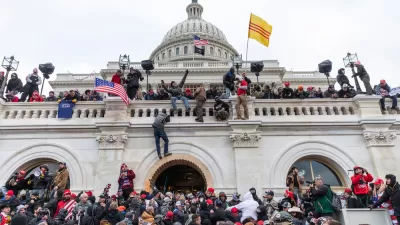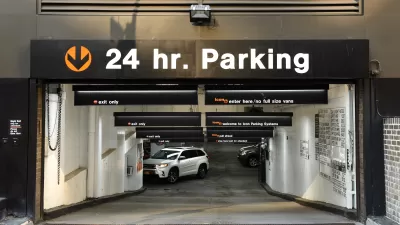Our job as planners is ultimately to manage change, which is often fun but occasionally ugly. A good example is a current debate over a supposed “war against the car.”
Our job as planners is ultimately to manage change, which is often fun but occasionally ugly. A good example is a current debate over a supposed "war against the car."
Current demographic and economic trends (aging population, rising fuelprices, increasing urbanization, changing consumer preferences, and increasing health and environmental concerns) are raising demand for alternative modes. People increasingly want to walk, bicycle and use public transport, provided these modes are convenient and comfortable to use. Meeting this demand can help achieve various planning objectives, including congestion reductions, road and parking facility cost savings, consumer saving, and improved public health, to name just a few. It therefore makes sense to shift a portion of resources (road space and money) currently dedicated to automobile transport to support other modes, and to reform land use policies to help create more multi-modal communities.
But some Americans fear these changes. Many lead automobile-dependent lifestyles and have never experienced an efficient, multi-modal transport system or an attractive and successful urban neighborhood. As a result, they assume that such changes will harm them overall. Some people and groups exploit this fear by claiming that a war exists against cars and suburbs. According to this narrative, motorists are victims of unfair attacks on their rights and freedoms, and are therefore entitled to defend themselves from a devious enemy.
Is there really a "war on cars," that is, a coordinated effort to unjustifiably restrict automobile use? Evidence of a war consists of exaggerated objections to policies such as traffic calming (which increases traffic safety), busways and bike lanes (which improve transport options, reducing traffic congestion and motorists' chauffeuring burdens), and more efficient road and parking pricing (which reduces traffic and parking problems, and helps finance facilities). These policies, which critics call "anti-car," are often the most effective solutions to transportation problems, and ultimately benefit motorists. These are no more "anti-car" than a healthy diet is "anti-food."
Truth is often the first victim of war, real or percieved. There is plenty of room for legitimate debate about transport policy issues, but describing it as a war changes the nature of the debate. It makes the issues ideological and absolute, and implies that motorists are justified in defending their interests with dishonest and destructive tactics.
This issue affects me personally because my research has been caught in the crossfire. It was attacked, inaccurately I believe, by Wendell Cox in his paper, Washington's War on Cars and the Suburbs: Secretary LaHood's False Claims on Roads and Transit. Cox criticises the USDOT's liveability initiative and my research which LaHood cited in support of policy reforms. His analysis misrepresents issues and data, violating basic principles of fair debate.
My research, published in the report Rail Transit In America and various articles, evaluated the transport system performance of 120 U.S. urban regions categorized according to their public transit system quality. It found that the regions with the highest quality transit had significantly lower per capita traffic congestion delays, accident rates, transportation expenses and energy consumption, plus more cost effective transit service. Other studies using different methodologies and datasets reach similar conclusions. Cox attacks these findings with clever but inaccurate arguments.
Much of this debate hinges on analysis details. My research shows that residents of communities with high quality public transit drive fewer annual vehicle-miles on average, which provides benefits that are only percieved when impacts are measured per capita. Cox only compares energy consumption per passenger-mile, which ignores most of the energy savings provided by high quality public transit.
Cox claims that rail transit systems have failed to attract ridership, which is sort of true since transit mode share declined in most North American cities during the last half-century, but the decline was much smaller in cities with high quality transit systems.
Cox claims that public transit travel is inefficient and unfairly subsidized, based on comparisons that ignore a host of differences between automobile and transit cost profiles. When these factors are considered it turns out that transit commuters typically receive less subsidy per capita than urban motorists, and that public transit service improvements are often the most cost-effective way address urban transportation problems.
A particularly egregious example of Cox's misrepresentations is his analysis of consumer savings. Using the Bureau of Labor Statistics' Consumer Expenditure Survey, I found that households located in areas with high quality transit spend about 20% less on transportation (vehicles, fuel and transit fares) than elsewhere. This indicates that consumers receive a high financial return on their transit investments. Cox used a different dataset, the American Chamber of Commerce Research Association's Cost of Living Index, to argue that the cities with high quality transit have higher transport costs, but that dataset is totally different; it compares the purchase price of a standard bundle of goods typically consumed by higher income households (it is designed to help businesses set executive wages), it does not account for differences in consumption and therefore the savings provided by high quality transit. Cox either did not understand these differences or intentionally misrepresents this issue in his attacks.
Some of Cox's claims indicate that he simply repeated a standard set of arguments without actually analyzing my research. For example, he claimed that my results were dominated by New York, but I'd heard this criticism before so several year ago I ran the analysis excluding New York, and the results hardly changed, indicating that any city can benefit from high quality public transport. He also claimed that my analysis is intended to "demonstrate the ineffectiveness of buses as a mode of transport", which is wrong. My analysis actually concerns transit service quality: frequency, relative speed, comfort, and the degree it is integrated into a community. This applies to both rail and bus. I am actually a great supporter of Bus Rapid Transit, as discussed in previous Planetizen blogs.
One particularly ironic criticism by Cox is that my work lacks peer review. In fact, summary versions of my analysis were published in two leading professional journals, the Transportation Research Record in 2005, and Transport Policy in 2007. In a typical year I publish about a dozen peer-reviewed papers and articles, to my knowledge Cox seldom or never does. After I made these points Cox reversed his position, arguing that peer review is no indication of analysis quality.
These are difficult but important issues for planners. We work at the intersection between objective technical analysis and ideological debates. We therefore must be prepared to carefully evaluate and respond to inaccurate cciticism in a dignified and professional way. Please let me know how well you think I've done this in my recent report, The First Casualty of a Non-Existent War.
For More Information
Wendell Cox (2010), Washington's War on Cars and the Suburbs: Secretary LaHoods False Claims on Roads and Transit, Heritage Foundation (www.heritage.org); at http://thf_media.s3.amazonaws.com/2010/pdf/SR0079.pdf.
Wendell Cox (2011) Urban Transportation Policy Requires Factual Foundations, Heritage Foundation (www.heritage.org); at http://heritage.org/Research/Reports/2011/02/Urban-Transportation-Policy-Requires-Factual-Foundations.
Eric De Place (2011), "War On Cars": A History, Sightline Institute (www.sightline.org); at http://daily.sightline.org/daily_score/archive/2011/01/03/war-on-cars-a-history.
Sarah Goodyear (2011), "The Latest Battle in the Nonexistent ‘War on Cars'," Grist (www.grist.org), 23 March 2011; at www.grist.org/article/2011-03-23-the-latest-battle-in-the-non-existent-war-on-cars.
Ray LaHood (2010), "Public Transportation Delivers Public Benefits," Welcome to the Fast Lane: The Official Blog of the U.S. Secretary of Transportation, U.S. Department Of Transportation; at http://fastlane.dot.gov/2009/06/public-transportation-delivers-public-benefits.html.
Todd Litman (2004), Rail Transit In America: Comprehensive Evaluation of Benefits, Victoria Transport Policy Institute (www.vtpi.org); at www.vtpi.org/railben.pdf.
Todd Litman (2008a), Evaluating Rail Transit Criticism, Victoria Transport Policy Institute (www.vtpi.org); at www.vtpi.org/railcrit.pdf.
Todd Litman (2008b), Evaluating Criticism of Smart Growth, VTPI (www.vtpi.org); at www.vtpi.org/sgcritics.pdf.
Todd Litman (2011), The First Casualty of a Non-Existent War: Evaluating Claims of Unjustified Restrictions on Automobile Use, and a Critique of 'Washington's War On Cars And The Suburbs', Victoria Transport Policy Institute (www.vtpi.org); at www.vtpi.org/carwars.pdf.
"Transportation Secretary Endorses Anti-Car Agenda," The Newspaper: A Journal of the Politics of Driving (www.thenewspaper.com/news/27/2789.asp).
Edward Niedermeyer (2010), Review of "Carjacked: The Culture Of The Automobile And Its Effects On Our Lives" for the car enthusiasts' website The Truth About Cars (www.thetruthaboutcars.com); at www.thetruthaboutcars.com/2010/02/book-review-carjacked-the-culture-of-automobiles-and-its-effects-on-our-lives.

Trump Administration Could Effectively End Housing Voucher Program
Federal officials are eyeing major cuts to the Section 8 program that helps millions of low-income households pay rent.

Planetizen Federal Action Tracker
A weekly monitor of how Trump’s orders and actions are impacting planners and planning in America.

Ken Jennings Launches Transit Web Series
The Jeopardy champ wants you to ride public transit.

Washington Legislature Passes Rent Increase Cap
A bill that caps rent increases at 7 percent plus inflation is headed to the governor’s desk.

From Planning to Action: How LA County Is Rethinking Climate Resilience
Chief Sustainability Officer Rita Kampalath outlines the County’s shift from planning to implementation in its climate resilience efforts, emphasizing cross-departmental coordination, updated recovery strategies, and the need for flexible funding.

New Mexico Aging Department Commits to Helping Seniors Age ‘In Place’ and ‘Autonomously’ in New Draft Plan
As New Mexico’s population of seniors continues to grow, the state’s aging department is proposing expanded initiatives to help seniors maintain their autonomy while also supporting family caregivers.
Urban Design for Planners 1: Software Tools
This six-course series explores essential urban design concepts using open source software and equips planners with the tools they need to participate fully in the urban design process.
Planning for Universal Design
Learn the tools for implementing Universal Design in planning regulations.
Heyer Gruel & Associates PA
Ada County Highway District
Institute for Housing and Urban Development Studies (IHS)
City of Grandview
Harvard GSD Executive Education
Toledo-Lucas County Plan Commissions
Salt Lake City
NYU Wagner Graduate School of Public Service






























